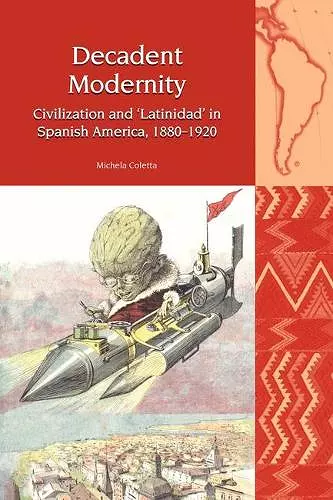Decadent Modernity
Civilization and 'Latinidad' in Spanish America, 1880-1920
Format:Paperback
Publisher:Liverpool University Press
Published:1st Sep '21
Should be back in stock very soon

This insightful work examines how Latin American countries defined their modernity through cultural representations, focusing on race, identity, and aesthetics in Decadent Modernity.
In Decadent Modernity, the author delves into the intricate ways Latin Americans represented their nations during a transformative period. By examining the late nineteenth and early twentieth centuries, the book engages with the concept of modernity as a dual-edged sword, where notions of progress coexist with ideas of decadence. It highlights how various intellectual groups utilized European sociological and medical theories to craft cultural representations that often revolved around the theme of degeneration.
Through a comparative analysis of Argentina, Uruguay, and Chile, Decadent Modernity investigates four pivotal themes that shaped the understanding of Latin American modernity: race and the nation, the quest for the autochthonous, education, and aesthetic values. This exploration reveals the complexities of how different societies negotiated their identities in the shadow of colonial legacies, employing a transnational perspective to illustrate the adoption and adaptation of civilizational constructs.
Ultimately, the book illuminates the discursive negotiations that contributed to the formation of the concept of 'Latin America' itself. By emphasizing the intersections of race, politics, and aesthetics, Decadent Modernity serves as a vital resource for scholars in literary and cultural studies, as well as historians seeking to understand the multifaceted nature of modernity in the region.
Reviews 'This strikingly original book analyses how intellectuals in Argentina, Chile and Uruguay explored the concept of degeneration as inherent within their emerging modern nations. In this interpretation, the Latinity of Latin America is seen not as the wellspring of civilisation but as a source of over refined decadence. Thus there is a paradox at the heart of their nations whose development was based on widespread immigration from southern Europe: that progress and modernisation were inextricably bound up with Latin decadence and degeneration. Ways out of this dilemma were found by promoting different forms of regeneration. Based on a vast range of primary and secondary sources, theoretically informed, elegantly structured and fluently written, this comparative study offers a fresh and very substantial contribution to our understanding of the processes of modernity and modernisation in Latin America.'
John King, University of Warwick
‘Two key ideas are at the core of Coletta's important book on Spanish American modernities at the turn of the twentieth century. The first is that a common thread runs through the ways in which these 'multiple modernities' unfolded in the region: the widely accepted polarity between 'progress' and 'degeneration' (or 'civilization' and 'barbarism') can be seen, rather than as a rigid relation between opposites, as an intrinsically complementary one. [...] The second idea that informs the book is that the notion of 'Latinity' is key to understanding the forces of regeneration that were advocated to free the young American nations from modernity's 'degenerative' tendencies.’
Eduardo Zimmermann, Estudios Interdisciplinarios de América Latina y el Caribe
‘The book makes use of extensive primary sources, from which telling details are selected. It gathers together key contributions from the time (for example, that of Carlos Octavio Bunge) as well as those contributions that history has unfairly – though perhaps inevitably – forgotten. It is at its most effective when working outwards from these texts.’
Adam Sharman, Journal of Latin American Studies
ISBN: 9781800855878
Dimensions: unknown
Weight: unknown
200 pages